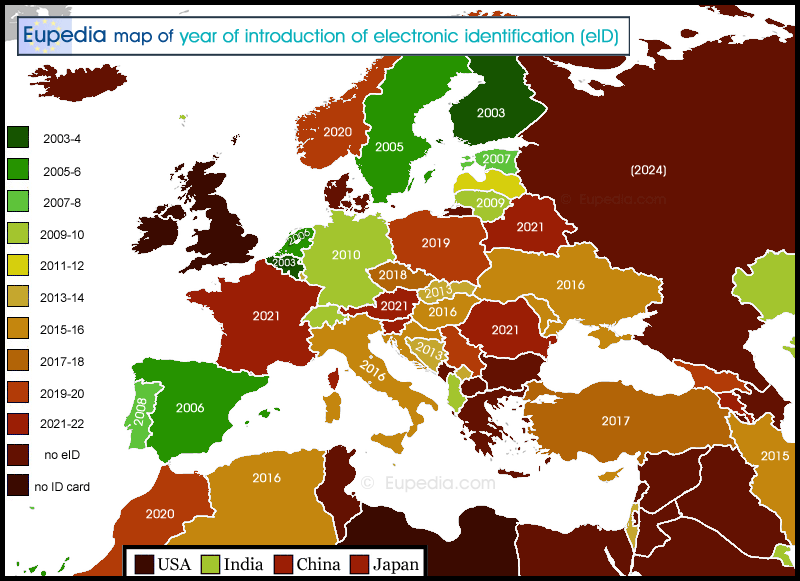Some 70 countries worldwide now use eID cards. Belgium and Finland were the first countries to introduce them in 2003, followed by Sweden (2005), the Netherlands (2006) and Spain (2006). In 2007, Estonia became the first country to allow electronic voting for parliamentary elections. Nowadays most European countries have biometric ID cards with an electronic chip and/or contactless NFC microchip. In contrast most English-speaking countries do not even use ID cards, let alone electronic ones.

Electronic ID cards are extremely useful. They replace passports when travelling around most of Europe (the only exceptions are Russia, Belarus, Ukraine, and the UK since Brexit). They allow you to log in securely in government online services or provide proof of medical insurance when visiting a doctor or hospital. In Belgium, doctors do not print paper prescriptions any more. Prescriptions are automatically sent to one's ID card and pharmacists can see the prescriptions on their computer screen on we show our ID card. That lowers the amount of paper waste, but also prevents some patients from making copies of prescriptions and obtaining several times the prescribed medicines in different pharmacies.
From 2023 Belgium is going to introduce digital ID card available on one's smartphone through a secure app (a bit like the digital Covid certificates). France show follow next year, probably trying to make up for the wasted time after having introduced eID only in 2021, later than practically all other European countries.
Note that Denmark is a special case on the European scene. The Danes do have national ID cards, but unlike other countries these are not valid outside their own country as a proof of identification. I don't know why they did that as there is no upside to it.

Electronic ID cards are extremely useful. They replace passports when travelling around most of Europe (the only exceptions are Russia, Belarus, Ukraine, and the UK since Brexit). They allow you to log in securely in government online services or provide proof of medical insurance when visiting a doctor or hospital. In Belgium, doctors do not print paper prescriptions any more. Prescriptions are automatically sent to one's ID card and pharmacists can see the prescriptions on their computer screen on we show our ID card. That lowers the amount of paper waste, but also prevents some patients from making copies of prescriptions and obtaining several times the prescribed medicines in different pharmacies.
From 2023 Belgium is going to introduce digital ID card available on one's smartphone through a secure app (a bit like the digital Covid certificates). France show follow next year, probably trying to make up for the wasted time after having introduced eID only in 2021, later than practically all other European countries.
Note that Denmark is a special case on the European scene. The Danes do have national ID cards, but unlike other countries these are not valid outside their own country as a proof of identification. I don't know why they did that as there is no upside to it.

